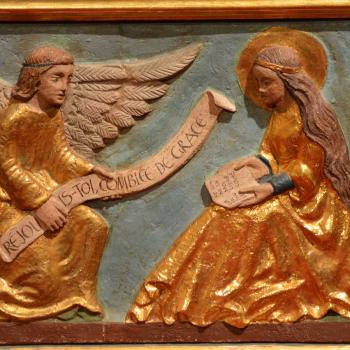
(image via Pixabay)
I enjoy a good horror film. I like the aesthetics of a well-crafted scare, and I like the truths that horror films tell. Life can be dreadful, and in order to cope with that, people need a certain amount of dread and even despair peppering the art they consume. It would be a terrible thing if all art was horror, but I believe scary stories are an important part of the healthy literary diet.
And I am a big fan of William Friedkin’s 1973 film The Exorcist. I realize that not all Catholics are. The film comes from a decidedly non-Catholic worldview. It’s a cynical and depressing story, a cry from a world that has forgotten God, but as such it’s a good story told well. I like it for its delightful ability to shock and frighten, as well as for its off-beat and unusual level of authenticity. Even though it’s not from a Catholic worldview, every time a Catholic appears in Friedkin’s The Exorcist, they act like a Catholic. All the little details are accurate. They genuflect and kneel at the right times; they cross themselves in the right way. Father Karras acts just like a cradle Catholic priest who’s having doubts, and that’s a difficult performance to give. It’s a fun, powerful, extremely effective movie.
I am not so sure about Fox’s new series, The Exorcist. The first thirty minutes of its forty-four minute premier left me scratching my head, both at its dull pacing and at the issue of accuracy. However, the last fifteen minutes are quite good and make me want to give the series another chance next week.
Fox’s The Exorcist, the story of a doubt-riddled young Catholic priest investigating spooky happenings at a parishioner’s house, purports itself to be based upon the William Peter Blatty novel The Exorcist, though it borrows a legion of stylistic and cinematographic elements from the William Friedkin film. It also refers briefly to the events in the Exorcist film as though they were historic– an unfortunate misstep, in my opinion, as it only serves to remind the audience that it could turn off the television at any minute and watch Friedkin’s film. Everything Friedkin did excellently, Fox does at best adequately, and sometimes boringly. Friedkin could create atmosphere by filming wind-swept leaves on an urban street; Fox’s homage just looks cluttered. Friedkin could make a well-decorated urban house into a menace, just through the beauty of the filming; Fox provides many dark camera shots of well-decorated hallways that don’t pack any punch. And this is a shame, because in the latter third of the program, Fox does something interesting and relatively unique with its re-imagining, something the audience would like if our patience hadn’t been so tried. I hope the next episode continues to go its own way instead of trying to be something it’s not.
The first episode Fox’s The Exorcist starts off extremely slowly paced. This isn’t necessarily a deal-breaker in and of itself. Repeated, gradually lengthening and intensifying doses of terror in between streaks of slow-paced character building is a classic technique in the horror genre. Friedkin’s film version of The Exorcist also started off at a slow, almost sedated pace, the better to shock the audience with its horrific moments as the film progressed. But the “slow burn” technique is a risky gamble for the film and television artist– particularly for television, when the audience’s attention is much more divided. An audience sitting in a theater can’t switch over to the news, or turn on Netflix and watch the real Exorcist; the audience watching Fox can, and I imagine some did. This is a shame because, as I said, the last fifteen minutes are good.
The other issue that Fox’s The Exorcist has to overcome is its lack of authenticity and accuracy in the portrayal of Catholicism. It’s perfectly fine to tell a story about an unfaithful Catholic priest. Some priests are unfaithful, and we can make art about that if we’ve anything original to say. And, of course, this is not a documentary about exorcisms but a horror series, a kind of fantasy. One expects to find fictional elements in fantasy. But if a fantasy story is going to involve an extant religion, then the writers, actors and directors are under an artistic obligation to be faithful to their subject. They have to do enough research that the religion is portrayed with accuracy. No matter how cynically, comically or irreverently the religion is being portrayed, it’s not art if it’s not at least somewhat honest. I was offended when Pure Flix’s The Encounter: Paradise Lost presented a humiliatingly inaccurate version of Buddhism, and I’m more offended that Fox doesn’t seem to know or care what a real Catholic priest acts like. They’ve managed to dress their actors in Roman collars, but the actors have done no research in the way they stand in the pulpit, throw holy water or read prayers. The writers don’t know how to write Catholic dialogue, either– most priests don’t refer to priesthood as “My job,” the way Father Tomas incessantly does, and I’ve never heard a non-traditional exorcist called out for a “breach of protocol.” The very way the congregation sits and listens to an uninspired homily lacks authenticity. No one working on this project has ever seen a Catholic– or, if they have, they didn’t pay attention.
These constant small inaccuracies riddling the pilot of The Exorcist did not entirely sink the series for me. There’s enough artistry present that I’m willing to give it another chance. Indeed, given the extremely promising plot-twist at the episode’s ending, I’m excited to give it another chance. However, if the general ignorance of the writing, direction and acting gets any worse it will be laughable, and I do hope they improve the pace.
The Exorcist can be watched on Fox, Friday nights at 9 Eastern time. Steel Magnificat will be reviewing episodes of The Exorcist on Saturday nights up until your humble author gets bored with them.

















